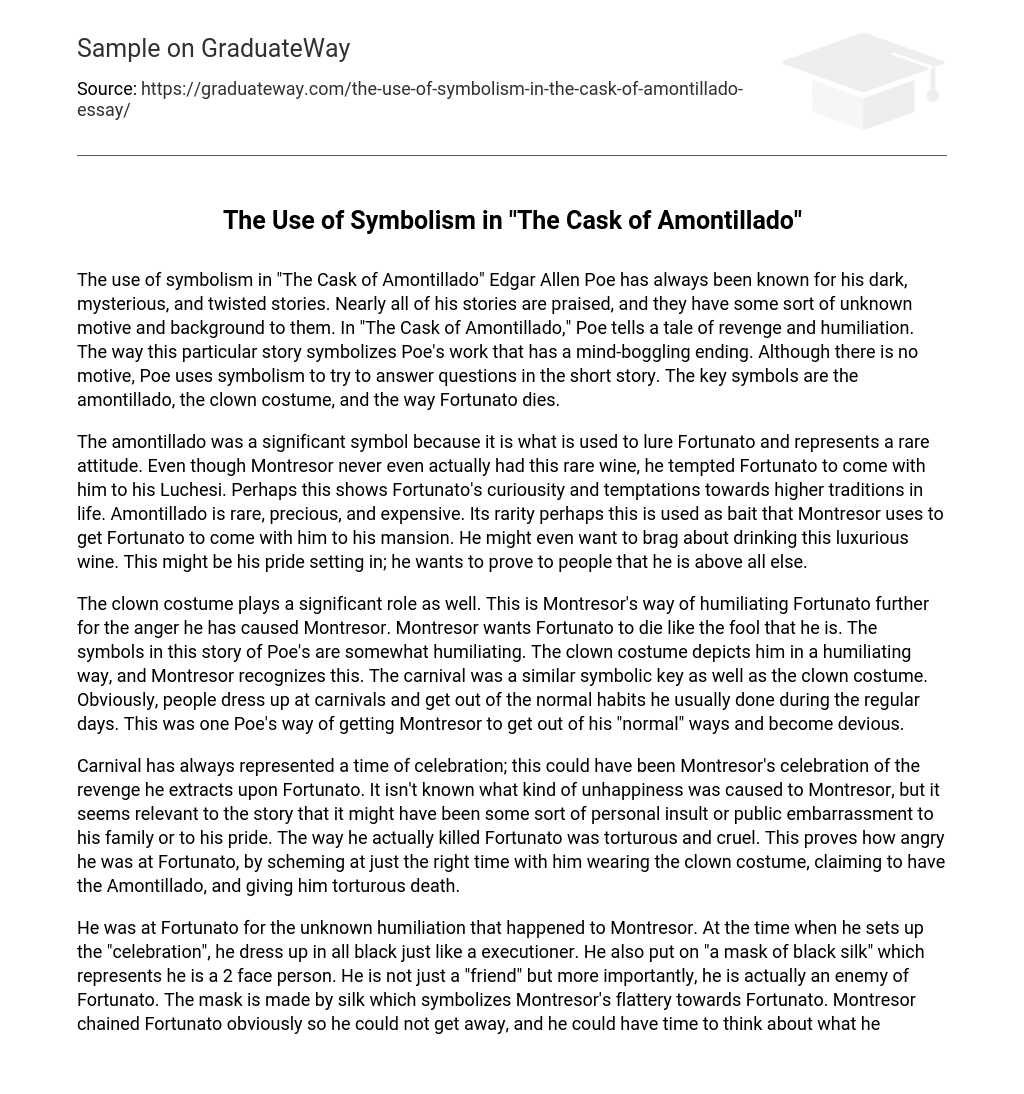The use of symbolism in “The Cask of Amontillado” Edgar Allen Poe has always been known for his dark, mysterious, and twisted stories. Nearly all of his stories are praised, and they have some sort of unknown motive and background to them. In “The Cask of Amontillado,” Poe tells a tale of revenge and humiliation. The way this particular story symbolizes Poe’s work that has a mind-boggling ending. Although there is no motive, Poe uses symbolism to try to answer questions in the short story. The key symbols are the amontillado, the clown costume, and the way Fortunato dies.
The amontillado was a significant symbol because it is what is used to lure Fortunato and represents a rare attitude. Even though Montresor never even actually had this rare wine, he tempted Fortunato to come with him to his Luchesi. Perhaps this shows Fortunato’s curiousity and temptations towards higher traditions in life. Amontillado is rare, precious, and expensive. Its rarity perhaps this is used as bait that Montresor uses to get Fortunato to come with him to his mansion. He might even want to brag about drinking this luxurious wine. This might be his pride setting in; he wants to prove to people that he is above all else.
The clown costume plays a significant role as well. This is Montresor’s way of humiliating Fortunato further for the anger he has caused Montresor. Montresor wants Fortunato to die like the fool that he is. The symbols in this story of Poe’s are somewhat humiliating. The clown costume depicts him in a humiliating way, and Montresor recognizes this. The carnival was a similar symbolic key as well as the clown costume. Obviously, people dress up at carnivals and get out of the normal habits he usually done during the regular days. This was one Poe’s way of getting Montresor to get out of his “normal” ways and become devious.
Carnival has always represented a time of celebration; this could have been Montresor’s celebration of the revenge he extracts upon Fortunato. It isn’t known what kind of unhappiness was caused to Montresor, but it seems relevant to the story that it might have been some sort of personal insult or public embarrassment to his family or to his pride. The way he actually killed Fortunato was torturous and cruel. This proves how angry he was at Fortunato, by scheming at just the right time with him wearing the clown costume, claiming to have the Amontillado, and giving him torturous death.
He was at Fortunato for the unknown humiliation that happened to Montresor. At the time when he sets up the “celebration”, he dress up in all black just like a executioner. He also put on “a mask of black silk” which represents he is a 2 face person. He is not just a “friend” but more importantly, he is actually an enemy of Fortunato. The mask is made by silk which symbolizes Montresor’s flattery towards Fortunato. Montresor chained Fortunato obviously so he could not get away, and he could have time to think about what he has done to his “friend. ” Montresor stoning up Fortunato was a way for him to never humiliate him ever again.
This was a way for Montresor to forget this even happened to himself at all. . Montresor has done it because he wanted Fortunato to die in a humiliating fashion that Montresor believed he deserved. Was it public humiliation or a personal insult? The answers are nearly infinite. Poe intentionally left out the motive for killing Fortunato due to the idea that the reader would wonder if Montresor was actually really mentally ill or whether or not he had a just reason for doing this. Edgar Allen Poe possibly attempts to make the reader wonder by not answer blatantly, but with symbolism.
Does this make the reader wonder? Of course it does. The amontillado represents something precious in his life, the clown costume making Fortunato get the reader to think of Fortunato as an idiot, and his death being Montresor’s way of trying to obtain his happiness back again. That might have been his intention. Montresor has control of this entire situation from the beginning; He lured him into the catacombs flawlessly, and he reassured him that he was beloved and as happy as he once was. Like a spider to a fly, Montresor enacted his revenge, in control all the time.





